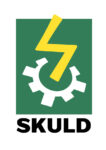Cofounder and CEO, Sarah Jordan, started Skuld LLC to merge 3D printing with lost foam investment casting, the greenest casting method. She is passionate about metals innovation and creating more efficient manufacturing processes. She has worked in additive manufacturing since 2015 and is a member of the America Makes Process Working Group and the Additive Manufacturing Users Group. She founded the Dayton chapter of Women in 3D Printing. Sarah has a BS in Metallurgical Engineering and an MS in Materials Science and Engineering from Ohio State University and an MBA from Carnegie Mellon University. She is currently also working part time on her PhD in Manufacturing Engineering at Worcester Polytechnic Institute with her dissertation focused on AMEC for 356 aluminum.
Represented Organization

Skuld
Key Innovation
By combining polymer 3D printing with lost foam investment casting, Skuld can eliminate the need for tooling, make parts in as little as 12 hours, permits the complex shapes of additive manufacturing, has 0.3% tolerances, and results in the same material as conventional manufacturing making it easier to qualify.
Skuld has three patents pending on their new manufacturing process called additive manufacturing evaporative casting (AMEC). AMEC joins together the capabilities of lost foam casting (a type of precision investment casting) and 3D printing of polymers. Compared with alternative AM processes, AMEC is faster, is capable of creating larger parts with precision tolerances, is less expensive, and has known microstructures for ease of part qualification. A basic proof of concept has been shown in a variety of metals. Skuld recently completed a US Department of Defense Small Business Innovation Research project to demonstrate AMEC in aluminum and an America Makes project to develop the process for Inconel alloys. Skuld is also working on several commercial prototypes. In September 2023 they are launching a machine, Lightning Metal™, to allow others to utilize the process.
This project is to further develop AMEC so that it can be more rapidly commercialized. The ultimate goal is to develop a metal additive process that is more broadly competitive with traditional manufacturing processes while providing the design and supply chain flexibility of AM. The project objectives include determination of design capabilities, materials characterization of additional alloys, and computational modeling.
